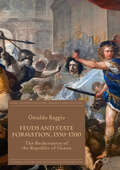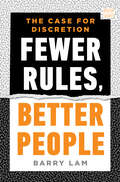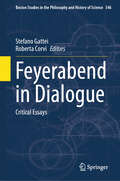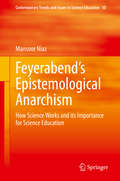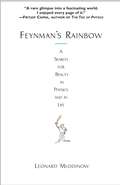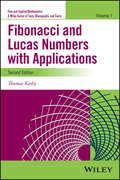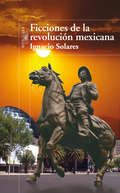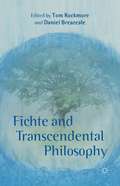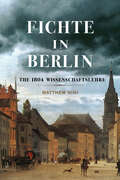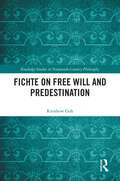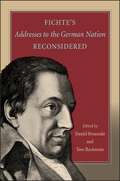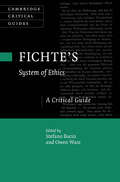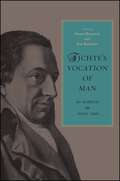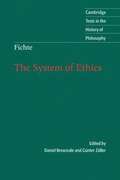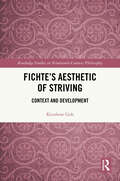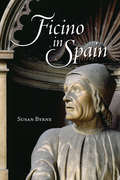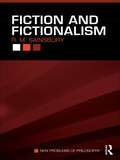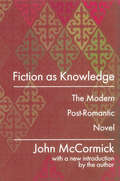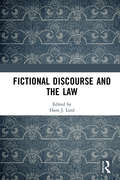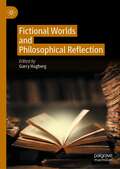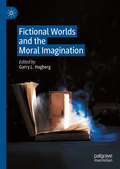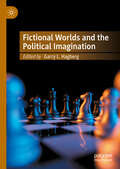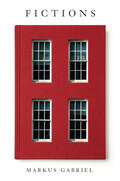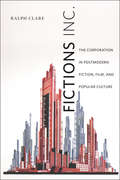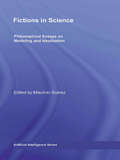- Table View
- List View
Feuds and State Formation, 1550–1700: The Backcountry of the Republic of Genoa (Early Modern History: Society and Culture)
by Osvaldo RaggioThis book re-evaluates the role of local agency and provides a new perspective to the political, social and cultural history of state formation, taking a microhistorical approach and through close analysis of archival sources between 1550 to 1700. The backcountry of the Republic of Genoa is a laboratory for gauging the weight and significance of two elements which, according to Charles Tilly and other scholars, have characterized the construction of the modern state: judicial administration and fiscal extraction. The instruments employed in this respect were arbitration and compensation. Interactions between center and periphery occurred within a stratified and discontinuous fabric of fluid jurisdictions and segmented residential topographies, which constituted spaces of mediation. Such spaces were generated by conflicts between kin groups (feuds and factional alignments) and managed both by Genoese officials and by local notables and notaries, who translated a whole set of local practices into judicial procedures. This book offers a rich contextualization of material life, family relationships, economic activities, and power struggles in a corner of the Mediterranean world that was extremely important, but about which very little has been published in English.
Fewer Rules, Better People: The Case for Discretion (A Norton Short)
by Barry LamA philosopher argues that the proliferation of rules and mandates is making us dumber, less moral, more deceptive, and less able to govern important institutions. Wherever there’s a rule, there is someone with the power to apply or ignore it—or add to it, in the interest of justice. From enforcing chores to issuing life sentences, decision-makers deliver flawed and sometimes arbitrary outcomes. But is their use of discretion good or bad overall? As a society, should we seek to minimize or maximize discretion, with all its potential for bias and other kinds of human error? Reframing our understanding of justice and ethics, philosopher Barry Lam argues that while use of discretion—whether by a sports referee, a parent, a police officer, or a judge—can never be perfect, removing it has even more problematic effects. Mandatory arrests and sentencing laws have not eliminated bias, but have corrupted the courtroom, institutionalized lying, and brought about even more unjust and arbitrary results. Fewer Rules, Better People is a bold, riveting treatise that sheds new light on political debates about law and justice while aiming to prepare us for the imminent threat of more “perfect,” discretion-less rule enforcement by AI.
Feyerabend in Dialogue: Critical Essays (Boston Studies in the Philosophy and History of Science #346)
by Stefano Gattei Roberta CorviThis book offers innovative historical scholarship on Feyerabend’s take on topics such as realism, empiricism, pluralism, materialism, and incommensurability. In addition to discussing certain debates in the philosophy of physics, it also considers the ways in which Feyerabend’s thought can contribute to contemporary debates in science and public policy. It does so by including questions about the nature of scientific methodology, the role of science in society, the public understanding of science, scientism, and the role of expertise in public policy. The chapters provide readers with a comprehensive overview of the topics that Feyerabend engaged with throughout his career, showing both the breadth and the depth of his thought. Though of great value to academics in philosophy of science, it is also accessible and appealing to non-academic audiences with a general interest in science.
Feyerabend’s Epistemological Anarchism: How Science Works and its Importance for Science Education (Contemporary Trends and Issues in Science Education #50)
by Mansoor NiazThis book argues that the traditional image of Feyerabend is erroneous and that, contrary to common belief, he was a great admirer of science. It shows how Feyerabend presented a vision of science that represented how science really works. Besides giving a theoretical framework based on Feyerabend´s philosophy of science, the book offers criteria that can help readers to evaluate and understand research reported in important international science education journals, with respect to Feyerabend’s epistemological anarchism. The book includes an evaluation of general chemistry and physics textbooks. Most science curricula and textbooks provide the following advice to students: Do not allow theories in contradiction with observations, and all scientific theories must be formulated inductively based on experimental facts. Feyerabend questioned this widely prevalent premise of science education in most parts of the world, and in contrast gave the following advice: Scientists can accept a hypothesis despite experimental evidence to the contrary and scientific theories are not always consistent with all the experimental data. No wonder Feyerabend became a controversial philosopher and was considered to be against rationalism and anti-science. Recent research in philosophy of science, however, has shown that most of Feyerabend´s philosophical ideas are in agreement with recent trends in the 21st century. Of the 120 articles from science education journals, evaluated in this book only 9% recognized that Feyerabend was presenting a plurality of perspectives based on how science really works. Furthermore, it has been shown that Feyerabend could even be considered as a perspectival realist. Among other aspects, Feyerabend emphasized that in order to look for breakthroughs in science one does not have to be complacent about the truth of the theories but rather has to look for opportunities to “break rules” or “violate categories.” Mansoor Niaz carefully analyses references to Feyerabend in the literature and displays the importance of Feyerabend’s philosophy in analyzing, historical episodes. Niaz shows through this remarkable book a deep understanding to the essence of science. - Calvin Kalman, Concordia University, Canada In this book Mansoor Niaz explores the antecedents, context and features of Feyerabend’s work and offers a more-nuanced understanding, then reviews and considers its reception in the science education and philosophy of science literature. This is a valuable contribution to scholarship about Feyerabend, with the potential to inform further research as well as science education practice.- David Geelan, Griffith University, Australia
Feynman's Rainbow: A Search for Beauty in Physics and in Life
by Leonard MlodinowAcademic scientist turned Hollywood screen writer, Mlodinow recounts his first year on the faculty at California Technical Institute, beginning in winter 1981, and his interactions there with renowned physicist Richard Feynman during his last years. Annotation (c)2003 Book News, Inc., Portland, OR (booknews.com)
Fibonacci and Lucas Numbers with Applications, Volume 1
by Thomas KoshyPraise for the First Edition “ …beautiful and well worth the reading … with many exercises and a good bibliography, this book will fascinate both students and teachers.” Mathematics Teacher Fibonacci and Lucas Numbers with Applications, Volume I, Second Edition provides a user-friendly and historical approach to the many fascinating properties of Fibonacci and Lucas numbers, which have intrigued amateurs and professionals for centuries. Offering an in-depth study of the topic, this book includes exciting applications that provide many opportunities to explore and experiment. In addition, the book includes a historical survey of the development of Fibonacci and Lucas numbers, with biographical sketches of important figures in the field. Each chapter features a wealth of examples, as well as numeric and theoretical exercises that avoid using extensive and time-consuming proofs of theorems. The Second Edition offers new opportunities to illustrate and expand on various problem-solving skills and techniques. In addition, the book features: • A clear, comprehensive introduction to one of the most fascinating topics in mathematics, including links to graph theory, matrices, geometry, the stock market, and the Golden Ratio • Abundant examples, exercises, and properties throughout, with a wide range of difficulty and sophistication • Numeric puzzles based on Fibonacci numbers, as well as popular geometric paradoxes, and a glossary of symbols and fundamental properties from the theory of numbers • A wide range of applications in many disciplines, including architecture, biology, chemistry, electrical engineering, physics, physiology, and neurophysiology The Second Edition is appropriate for upper-undergraduate and graduate-level courses on the history of mathematics, combinatorics, and number theory. The book is also a valuable resource for undergraduate research courses, independent study projects, and senior/graduate theses, as well as a useful resource for computer scientists, physicists, biologists, and electrical engineers. Thomas Koshy, PhD, is Professor Emeritus of Mathematics at Framingham State University in Massachusetts and author of several books and numerous articles on mathematics. His work has been recognized by the Association of American Publishers, and he has received many awards, including the Distinguished Faculty of the Year. Dr. Koshy received his PhD in Algebraic Coding Theory from Boston University. “Anyone who loves mathematical puzzles, number theory, and Fibonacci numbers will treasure this book. Dr. Koshy has compiled Fibonacci lore from diverse sources into one understandable and intriguing volume, [interweaving] a historical flavor into an array of applications.” Marjorie Bicknell-Johnson
Ficciones de la revolución mexicana
by Ignacio SolaresColección de cuentos en los que pasan Madero, Huerta, Felipe Ángeles, Rodolfo Fierro, Carranza, Obregón, León Toral. La magistral pluma de Ignacio Solares, ganador del Premio Fernando Benítez, nos acerca a un personaje histórico fundamental de México. De Madero y Huerta a Felipe Ángeles y Rodolfo Fierro, pasando por Carranza, Obregón, León Toral y muchos otros personajes, en cada cuento Ignacio Solares inquieta, deslumbra, sorprende a sus lectores con tramas en las que el destino reparte los balazos de manera distinta a la que consignan las versiones oficiales, los hechos ya no coinciden con las efemérides y los infiernos privados abren sus puertas al público, por si hubiera quien se atreva a trasponerlas. Revolución es una palabra que se extingue, dicen. Tiende a entrar en desuso. Sus oxidados bonos van siempre a la baja. Y sin embargo, los sueños que genera siguen teniendo poderes avasalladores y en ellos permanecen vivos los caudillos, los tiranos, la masa anónima que combatió por motivos concretos, o incluso sin ellos, y regó con sangre páginas de la historia y de las historias que integran este volumen. Lo que ha dicho la crítica: "Diecisiete variaciones, invenciones, diecisiete formas de recrear de manera novedosa una historia por demás manoseada. [...]Son cuentos que se dejan leer y proporcionan disfrute al lector". -Fernando García Ramírez, Letras Libres. "Con el humor que lo caracteriza, Ignacio Solares incursiona en el 'hubiera' para contar una historia distinta de Emiliano Zapata en Chinameca; el general Rodolfo Fierro practicaría la compasión humana; el destino de Pino Suárez no hubiera sido tan trágico y las soldaderas hubieran sido fusiladas por el gran adorador de las Mujeres: Pancho Villa".-Yanet Aguilar Sosa, El Universal.
Fichte And Transcendental Philosophy
by Tom Rockmore Daniel BreazealeWith renewed attention to German idealism in general and to Fichte in particular, this timely collection of new papers will be of interest to anyone concerned with transcendental philosophy, German idealism, modern German philosophy and transcendental arguments.
Fichte in Berlin: The 1804 Wissenschaftslehre (McGill-Queen’s Philosophy of Religion Series #1)
by Matthew NiniWhen the celebrated German philosopher Johann Gottlieb Fichte lost his position at the University of Jena and moved to Berlin, it looked as if his career was over. In 1799 Berlin had no university, and Fichte was consigned to lecturing in his home.In Fichte in Berlin Matthew Nini breaks with scholarly consensus, arguing it was there that Fichte finally reached maturity, and the only way to understand Fichte’s mature philosophy is to perform it for oneself. The book focuses on the philosopher’s 1804 lectures on the Wissenschaftslehre – an untranslatable neologism for his theories on the pursuit of insight – claiming that they are one of the most exemplary versions of the philosophical project that Fichte reconfigured some seventeen times throughout his life. While the 1804 lectures offer a more robust approach, they remain faithful to the insight at the heart of the original philosophy. Fichte’s work always emphasized the practical over the theoretical, and his 1804 work goes even further: to think with Fichte is to bring one’s own philosophy to life. Nini guides the reader step by step through the complex arguments Fichte made in 1804 and goes on to examine some of his other works produced in their wake, arguing that Fichte’s output from 1804 to 1806, his first Berlin period, forms an organic whole.Fichte in Berlin is not only an introduction to Fichte’s later philosophy, but also an original philosophical work that makes a unique contribution to the study of German Idealism.
Fichte on Free Will and Predestination (Routledge Studies in Nineteenth-Century Philosophy)
by Kienhow GohThe book explains Fichte’s position on free will and predestination, including its rationale and significance. It argues that Fichte affirms both free will and predestination and explains how he purports to do so without contradiction. The book presents Fichte‘s position as a form of compatibilism that has not yet been explored in the literature. Due to early rationalist convictions, Fichte is as much concerned with reconciling freedom with a logical and a theological determinism as he is with a causal determinism. He sees in Kant’s novel concept of a pure practical reason a new form of rationalism, one consisting of a system of moral rather than natural necessitating grounds. At the same time, he adopts a more radically libertarian stance on free will than Kant. Every member in a sequence of free actions is a “first and absolute member” and could be other than it is given the same antecedent natural events and natural laws. The interest of Fichte as a theorist of freedom lies in how he brings together freedom and predetermination in a way that challenges our assumption about their mutual exclusivity. The book provides an overview of Fichte’s philosophical system—the so-called “Doctrine of Science”—from 1793-1800 with the aim of contextualizing his theory of free agency and destiny. In doing so, it sheds light on how consideration of these issues in turn shapes the system. Fichte on Free Will and Predestination will be of interest to scholars and advanced students working on Fichte’s philosophy, the history of modern philosophy, German Idealism, and the history of the philosophical issue of free will.
Fichte's Addresses to the German Nation Reconsidered
by Daniel Breazeale; Tom RockmoreOne of J. G. Fichte's best-known works, Addresses to the German Nation is based on a series of speeches he gave in Berlin when the city was under French occupation. They feature Fichte's diagnosis of his own era in European history as well as his call for a new sense of German national identity, based upon a common language and culture rather than "blood and soil." These speeches, often interpreted as key documents in the rise of modern nationalism, also contain Fichte's most sustained reflections on pedagogical issues, including his ideas for a new egalitarian system of Prussian national education. The contributors' reconsideration of the speeches deal not only with technical philosophical issues such as the relationship between language and identity, and the tensions between universal and particular motifs in the text, but also with issues of broader concern, including education, nationalism, and the connection between morality and politics.
Fichte's System of Ethics: A Critical Guide (Cambridge Critical Guides)
by Stefano Bacin Owen WareThe System of Ethics was published at the height of Fichte's academic career and marks the culmination of his philosophical development in Jena. Much more than a treatise on ethics narrowly construed, the System of Ethics presents a unified synthesis of Fichte's core philosophical ideas, including the principle I-hood, self-activity and self-consciousness, and also contains his most detailed treatment of action and agency. This volume brings together an international group of leading scholars on Fichte, and is the first of its kind in English to offer critical and interpretive perspectives on this work, covering topics such as normativity, belief, justification, desire, duty, and the ethical life. It will be an essential guide for scholars wanting to deepen their understanding of Fichte's ethical thought, as well as for those interested in the history of ethics more broadly.
Fichte's Vocation of Man: New Interpretive and Critical Essays
by Daniel Breazeale; Tom RockmoreWritten for a general audience during a period of intense controversy in the German philosophical community, J. G. Fichte's short book The Vocation of Man (1800) is both an introduction to and a defense of his philosophical system, and is one of the best-known contributions to German Idealism. This collection of new essays reflects a wide and instructive variety of philosophical and hermeneutic approaches, which combine to cast new light upon Fichte's familiar text. The contributors highlight some of the overlooked complexities and implications of The Vocation of Man and situate it firmly within the intellectual context within which it was originally written, relating it to the positions of Kant, Hegel, Schelling, Schlegel, Jacobi, and others. In addition, the essays relate the text to issues of contemporary concern such as the limits of language, the character of rational agency, the problem of evil, the relation of theoretical knowledge to practical belief, and the dialectic of judgment.
Fichte: The System Of Ethics
by Johann Gottlieb Fichte Daniel Breazeale Guenter ZöllerFichte's System of Ethics, published in 1798, is at once the most accessible presentation of its author's comprehensive philosophical project, The Science of Knowledge or Wissenschaftslehre, and the most important work in moral philosophy written between Kant and Hegel. Fichte's ethics integrates the discussion of our moral duties into the systematic framework of a transcendental theory of the human subject. Its major philosophical themes include the practical nature of self-consciousness, the relation between reason and volition, the essential role of the drives in human willing, the possibility of changing the natural world, the reality of one's own body, the reality of other human beings, and the practical necessity of social relations between human beings. This volume offers a translation of the work together with an introduction that sets it in its philosophical and historical contexts.
Fichte’s Aesthetic of Striving: Context and Development (Routledge Studies in Nineteenth-Century Philosophy)
by Kienhow GohThis book explores Fichte's theory of sensibility, focusing on its theoretical and practical significance. It offers unique insight into Fichte’s reinterpretation of Kant's aesthetic theory.Fichte's theory of sensibility can be found in his unpublished manuscript Practical Philosophy (1793/94). The author approaches this text as Fichte's attempt to reorganize Kant’s transcendental aesthetic and aesthetic of pure practical reason into a unified whole. The first half contains one of the first chapter-length studies of Abicht’s Attempt at a Metaphysics of Gratification (1789) and Fichte’s Practical Philosophy. In this section, the author examines the context and development of a “philosophy of striving” in Practical Philosophy, explains the background of Fichte’s aesthetics, and provides a concise discussion of Kant’s sensationalist view of pleasure. The second half explores how the investigations in Practical Philosophy reemerge in the Jena period through the theory of aesthetic experience and artistic creation, theory of moral deliberation, and theory of truth and justification (particularly in philosophy) and illustrates the pivotal role Fichte assigns to feelings in human spiritual development.Fichte’s Aesthetic of Striving will be of interest to scholars and advanced students working in the history of modern philosophy, the history of aesthetics, German idealism, and 19th-century philosophy.
Ficino in Spain
by Susan ByrneAs the first translator of Plato's complete works into Latin, the Florentine writer Marsilio Ficino (1433-99) and his blend of Neoplatonic and Hermetic philosophy were fundamental to the intellectual atmosphere of the Renaissance. In Spain, his works were regularly read, quoted, and referenced, at least until the nineteenth century, when literary critics and philosophers wrote him out of the history of early modern Spain.In Ficino in Spain, Susan Byrne uses textual and bibliographic evidence to show the pervasive impact of Ficino's writings and translations on the Spanish Renaissance. Cataloguing everything from specific mentions of his name in major texts to glossed volumes of his works in Spanish libraries, Byrne shows that Spanish writers such as Miguel de Cervantes, Lope de Vega, Bartolomé de las Casas, and Garcilaso de la Vega all responded to Ficino and adapted his imagery for their own works. An important contribution to the study of Spanish literature and culture from the fifteenth to the seventeenth centuries, Ficino in Spain recovers the role that Hermetic and Neoplatonic thought played in the world of Spanish literature.
Fiction and Fictionalism (New Problems of Philosophy)
by R. M. SainsburyAre fictional characters such as Sherlock Holmes real? What can fiction tell us about the nature of truth and reality? In this excellent introduction to the problem of fictionalism R. M. Sainsbury covers the following key topics: what is fiction? realism about fictional objects, including the arguments that fictional objects are real but non-existent; real but non-factual; real but non-concrete the relationship between fictional characters and non-actual worlds fictional entities as abstract artefacts fiction and intentionality and the problem of irrealism fictionalism about possible worlds moral fictionalism. R. M. Sainsbury makes extensive use of examples from fiction, such as Sherlock Holmes, Anna Karenina and Madame Bovary and examines the work of philosophers who have made significant contributions to the topic, including Meinong, David Lewis, and Bas Van Fraassen. Additional features include chapter summaries, annotated further reading and a glossary of technical terms, making Fiction and Fictionalism ideal for those coming to the issue for the first time.
Fiction as Knowledge: Modern Post-romantic Novel
by John McCormickCritics of fiction have long been aware that the romantic movement in Europe and America gave a powerful impulse to the art of fiction. The exact nature of that impulse has resisted analysis like so much associated with romanticism. In Fiction as Knowledge John McCormick reaches for precision, proposing that much of the vitality of modern fiction derives from romantic conceptions of history which made available to fiction not merely historical subject matter, but new perceptions of reality, present and past, that pervade the work of many of the greatest writers of the post-romantic period.Beginning with Herder and Hegel, McCormick describes those qualities in historical thought that were revolutionary in the early nineteenth century and rich in meaning for the future. Most prominent of these was the emergence of the idea of individuality, not only in society but also in history. The author demonstrates the vitality of the romantic impulse in the work of seven major novelists of the twentieth century. Marcel Proust's apprehensions of nature in his great novel are seen as Wordsworthian, while as the novel unfolds, history in the form of event and system of organization comes to dominate and to offer a paradigm of the workings of the post-romantic historical imagination. William Faulkner and Andr Malraux are shown to confront history directly, although they do not write "historical" fiction. Herman Broch, Robert Musil, and Henri de Montherlant, uncomfortable with traditional romantic attitudes, still make fullest use of Romantic historical insight to extend the range of fiction as knowledge. Ernest Hemingway, by contrast, is seen as intuitive, a pure product of his novelist's intelligence as opposed to his latter-day romantic anti-intellectualism.Fiction as Knowledge supplies critical insight into the form of the novel as well as into the seven novelists under discussion. Not least, the book is a warning against contemporary anti-historical bias and an appeal to the cultivation of historical consciousness. John McCormick is Professor Emeritus of Comparative Literature at Rutgers University, and Honorary Fellow of English and Literature at the University of York. He is the author of George Santayana: A Biography, Catastrophe and Imagination, and The Middle Distance, by Transaction.
Fictional Discourse and the Law
by Hans J. LindDrawing on insights from literary theory and analytical philosophy, this book analyzes the intersection of law and literature from the distinct and unique perspective of fictional discourse. Pursuing an empirical approach, and using examples that range from Victorian literature to the current judicial treatment of rap music, the volume challenges the prevailing fact–fiction dichotomy in legal theory and practice by providing a better understanding of the peculiarities of legal fictionality, while also contributing further material to fictional theory’s endeavor to find a transdisciplinary valid criterion for a definition of fictional discourse. Following the basic presumptions of the early law-as-literature movement, past approaches have mainly focused on textuality and narrativity as the common denominators of law and literature, and have largely ignored the topic of fictionality. This volume provides a much needed analysis of this gap. The book will be of interest to scholars of legal theory, jurisprudence and legal writing, along with literature scholars and students of literature and the humanities.
Fictional Worlds and Philosophical Reflection
by Garry HagbergThis edited collection investigates the kinds of philosophical reflection we can undertake in the imaginative worlds of literature. Opening with a look into the relations between philosophical thought and literary interpretation, the volume proceeds through absorbing discussions of the ways we can see life through the lens of literature, the relations between philosophical saying and literary showing, and some ways we can see the literary past philosophically and assess its significance for the present. Taken as a whole, the volume shows how imagined contexts can be a source of knowledge, a source of conceptual clarification, and a source of insight and understanding. And because philosophical thinking is undertaken, after all, in words, a heightened sensitivity to the precise employments of our words – particularly philosophically central words such as truth, reality, perception, knowledge, selfhood, illusion, understanding, falsehood – can bring a clarity and a refreshed sense of the life that our words take on in fully-described contexts of usage. And in these imagined contexts we can also see more acutely and deeply into the meaning of words about words – metaphor and figurative tropes, verbal coherence, intelligibility, implication, sense, and indeed the word “meaning” itself. Moving from a philosophical issue into a literary world in which the central concepts of that issue are in play can thus enrich our comprehension of those concepts and, in the strongest cases, substantively change the way we see them. With a combination of conceptual acuity and literary sensitivity, this volume maps out some of the territory that philosophical reflection and literary engagement share.
Fictional Worlds and the Moral Imagination
by Garry L. HagbergThis edited collection investigates the kinds of moral reflection we can undertake within the imaginative worlds of literature. In philosophical contexts of ethical inquiry we can too easily forget that literary experience can play an important role in the cultivation of our ethical sensibilities. Because our ethical lives are conducted in the real world, fictional representations of this world can appear removed from ethical contemplation. However, as this stimulating volume shows, the dichotomy between fact and fiction cannot be so easily categorised. Moral perception, moral sensitivity, and ethical understanding more broadly, may all be developed in a unique way through our imaginative life in fiction. Moral quandaries are often presented in literature in ways more linguistically precise and descriptively complete than the ones we encounter in life, whilst simultaneously offering space for contemplation. The twelve original chapters in this volume examine literary texts – including theatre and film – in this light, and taken together they show how serious reflection within fictional worlds can lead to a depth of humane insight. The topics explored include: the subtle ways that knowledge can function as a virtue; issues concerning our relations to and understanding of each other; the complex intertwining of virtues and vices in the modern world; and the importance of bringing to light and reconsidering ethical presuppositions. With an appreciation of the importance of richly contextualized particularity and the power of descriptive acuity, the volume maps out the territory that philosophical reflection and literary engagement share.
Fictional Worlds and the Political Imagination
by Garry L. HagbergThere has been a steady stream of articles written on the relations between political thought and the interpretation of literature, but there remains a need for a book that both introduces and significantly contributes to the field – particularly one that shows in detail how we can think more freely and creatively about political possibilities by reading and reflecting on politically significant literature. This volume offers analytically acute and culturally rich ways of understanding how it is that we can productively think philosophically about political literature and what kind of distinctive conceptual progress we can make by doing so. Given the extremely widespread interest in political issues, this volume will strike resonant chords far and wide, while offering something that has not been done quite in this way and for which the time certainly seems right.
Fictions
by Markus GabrielFrom Ancient philosophy to contemporary theories of fiction, it is a common practice to relegate illusory appearances to the realm of the non-existent, like shadows on the wall of Plato’s cave. Contrary to this traditional mode of drawing a metaphysical distinction between reality and fiction, Markus Gabriel argues that the realm of the illusory, fictional, imaginary, and conceptually indeterminate is as real as it gets.Being in touch with reality need not and cannot require that we overcome appearances in order to grasp a meaningless reality which exists ‘out there,’ outside and maybe even beyond our minds. Human mindedness (Geist) exists in the mode of fictions through which we achieve self-consciousness. This novel approach provides a fresh perspective on our existence as subjects who lead their lives in the light of self-conceptions.Fictions also develops a social ontology according to which the social unfolds as a constant renegotiation of dissent, of different points of view onto the same reality. Thus, we cannot ever hope to ground human society in a fiction-free realm of objective transactions. However, this does not mean that truth and reality are somehow outdated concepts. On the contrary, we need to enlarge our conception of reality so that it fully encompasses ourselves as specifically minded social animals.This major new work of philosophy will be of interest to students and scholars throughout the humanities and to anyone interested in contemporary philosophy and social thought.
Fictions Inc.
by Ralph ClareFictions Inc. explores how depictions of the corporation in American literature, film, and popular culture have changed over time. Beginning with perhaps the most famous depiction of a corporation--Frank Norris's The Octopus--Ralph Clare traces this figure as it shifts from monster to man, from force to "individual," and from American industry to multinational "Other. " Clare examines a variety of texts that span the second half of the twentieth century and beyond, including novels by Thomas Pynchon, William Gaddis, Don DeLillo, Richard Powers, and Joshua Ferris; films such as Network, Ghostbusters, Gung Ho, Office Space, and Michael Clayton; and assorted artifacts of contemporary media such as television's The Office and the comic strips Life Is Hell and Dilbert. Paying particular attention to the rise of neoliberalism, the emergence of biopolitics, and the legal status of "corporate bodies," Fictions Inc. shows that representations of corporations have come to serve, whether directly or indirectly, as symbols for larger economic concerns often too vast or complex to comprehend. Whether demonized or lionized, the corporation embodies American anxieties about these current conditions and ongoing fears about the viability of a capitalist system.
Fictions in Science: Philosophical Essays on Modeling and Idealization (Routledge Studies in the Philosophy of Science)
by Mauricio SuárezScience is popularly understood as being an ideal of impartial algorithmic objectivity that provides us with a realistic description of the world down to the last detail. The essays collected in this book—written by some of the leading experts in the field—challenge this popular image right at its heart, taking as their starting point that science trades not only in truth, but in fiction, too. With case studies that range from physics to economics and to biology, Fictions in Science reveals that fictions are as ubiquitous in scientific narratives and practice as they are in any other human endeavor, including literature and art. Of course scientific activity, most prominently in the formal sciences, employs logically precise algorithmic thinking. However, the key to the predictive and technological success of the empirical sciences might well lie elsewhere—perhaps even in scientists’ extraordinary creative imagination instead. As these essays demonstrate, within the bounds of what is empirically possible, a scientist’s capacity for invention and creative thinking matches that of any writer or artist.
